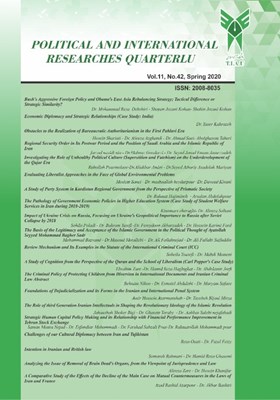Regional Security Order in Its Postwar Period and the Position of Saudi Arabia and the Islamic Republic of Iran
Subject Areas : Political and International Researches Quarterly
farzad navidi nia
1
![]() ,
Mahnaz Goodarzi
2
*
,
Seyed Javad Emam Jomezzadeh
3
,
Mahnaz Goodarzi
2
*
,
Seyed Javad Emam Jomezzadeh
3
1 -
2 -
3 -
Keywords: Saudi Arabia, ISIS, Balance of Power, Westphalian Order,
Abstract :
farzad navidi nia[1] Mahnaz Goodarzi[2] Seyed Javad Emam Jomezzadeh[3] Abstract: The Middle East is a full of tension area. The existence of despotic governments and relatively stable dictatorships has at least been governed by a threat balanced, state-owned security structure as part of the essence of the region. The rise of religious terrorism, extremism, and in particular its spread to al-Qaeda and Taliban groups and in the current era of ISIS, has gradually diminished this state-owned Westphalian order. In this article, the structure of the regional order of this part of the world in the post-war period and the situation of Saudi Arabia and the Islamic Republic is examined. Given the realistic approach, the main claim of this article is that ISIS in the context of terror assimilation has transformed the pattern of balance of power into unstable patterns. Thus, in the post-war period, regional governments will experience close relations to strengthen their desired security order. This article is a library-based descriptive method. [1]- PhD Student of International Relations, Isfahan Branch, Islamic Azad University, Isfahan, Iran [2]- Assistant Professor, Department of International Relations, Isfahan Branch, Islamic Azad University, Isfahan, Iran:Corresponding Author [3]-Associate Professor, Department of Political Science and International Relations, University of Isfahan, Isfahan, Iran
_||_

